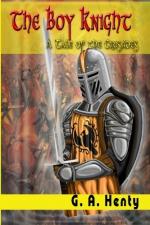Gradually it came to his ears that the outlaws were commanded by a man who had been their leader in times gone by, but who had been pardoned, and had, with a large number of his band, taken service in the army of the Crusaders; also, that there was present a stranger, whose manner and the deference paid to him by Cnut proclaimed him to be of gentle blood. This news awakened grave uneasiness on the part of Sir Rudolph. The knight caused inquiries to be made, and ascertained that Cnut had been especially attached to the young Cuthbert, and that he had fought under the Earl of Evesham’s banner. It seemed possible then that with him had returned the claimant for the earldom; and in that case Sir Rudolph felt that danger menaced him, for the bravery of the Earl of Evesham’s adopted son had been widely spoken of by those who had returned from the Holy Land.
Sir Rudolph was a man of forty, tall and dark, with Norman features. He held the Saxons in utter contempt, and treated them as beings solely created to till the land for the benefit of their Norman lords. He was brave and fearless, and altogether free from the superstition of the times. Even the threats of the pope, which although Prince John defied them yet terrified him at heart, were derided by his follower, who feared no one thing in the world, save, perhaps, the return of King Richard from captivity.
No sooner had the suspicion that his rival was in the neighborhood possessed him than he determined that one of two things must be carried out: either Sir Cuthbert must be killed, or the Lady Margaret must be carried off and forced to accept him as her husband. First he endeavored to force Sir Cuthbert to declare himself and to trust to his own arm to put an end to his rival. To that end he caused a proclamation to be written, and to be affixed to the door of the village church at the fair of Evesham.
Cnut and several of his followers were there, all quietly dressed as yeomen. Seeing a crowd round the door of the church, he pressed forward. Being himself unable to read writing, he asked one of the burgesses what was written upon the paper which caused such excitement.
“It is,” the burgess said, “in the nature of a cartel or challenge from our present lord, Sir Rudolph. He says that it having come to his ears that a Saxon serf, calling himself Sir Cuthbert, Earl of Evesham, is lurking in the woods and consorting with outlaws and robbers, he challenges him to appear, saying that he will himself, grievously although he would demean himself by so doing, yet condescend to meet him in the lists with sword and battle-ax, and to prove upon his body the falseness of his averments. Men marvel much,” the burgess continued, “at this condescension on the earl’s part. We have heard indeed that King Richard, before he sailed for England, did, at the death of the late good earl, bestow his rank and the domains of Evesham upon Sir Cuthbert, the son of the Dame Editha. Whether it be true or not, we cannot say; but it seems strange that such honor should have been bestowed upon one so young. In birth indeed he might aspire to the rank, since his father, Sir Walter, was a brave knight, and the mother, Dame Editha, was of good Saxon blood, and descended from those who held Evesham before the arrival of the Normans.”




